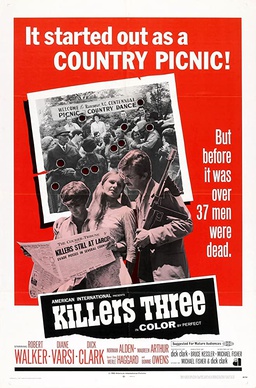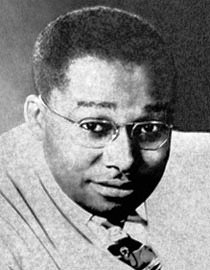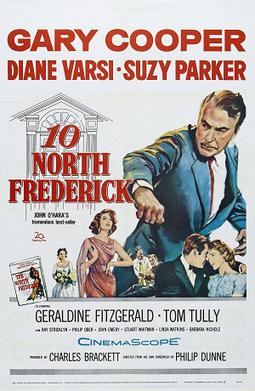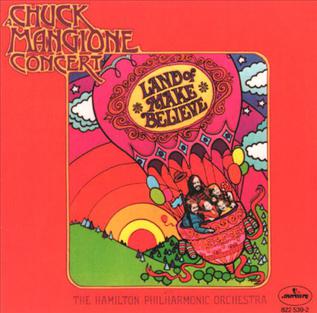
Sherlock Jr. is a 1924 American silent comedy film starring and directed by Buster Keaton and written by Clyde Bruckman, Jean Havez, and Joseph A. Mitchell. It features Kathryn McGuire, Joe Keaton, and Ward Crane.

Kids in the Hall: Brain Candy is a 1996 Canadian comedy film written by and starring the Canadian comedy troupe The Kids in the Hall. Directed by Kelly Makin and filmed in Toronto, it followed the five-season run of their television series The Kids in the Hall, which had been successful in both Canada and the United States.

Killers Three is an American crime drama film produced in 1968 by Dick Clark Productions and released by American International Pictures starring Robert Walker Jr., Diane Varsi and Dick Clark. Others in the cast include Norman Alden, Maureen Arthur, Merle Haggard and Bonnie Owens.

Richard Leacock was a British-born documentary film director and one of the pioneers of direct cinema and cinéma vérité.

Joseph Christopher Liggins, Jr. was an American R&B, jazz and blues pianist and vocalist who led Joe Liggins and his Honeydrippers in the 1940s and 1950s. His band appeared often on the Billboard magazine charts. The band's biggest hit was "The Honeydripper", released in 1945. Joe Liggins was the older brother of R&B performer Jimmy Liggins.
"Mad About the Boy" is a popular song with words and music by actor and playwright Noël Coward. It was introduced in the 1932 revue Words and Music by Joyce Barbour, Steffi Duna, Norah Howard and Doris Hare. The song deals with the theme of unrequited love for a film star. It was written to be sung by female characters, although Coward also wrote a version which was never performed, containing references to the then-risqué topic of homosexual love. The song gained new popularity in 1992 when Dinah Washington's rendition was used in the Levi's television advertisement "Swimmer", directed by Tarsem Singh.
Richard Bernard Halligan was an American musician and composer, best known as a founding member of the jazz-rock band Blood, Sweat & Tears.

Carry On Dick is a 1974 British comedy film, the 26th release in the series of 31 Carry On films (1958–1992). The story is based on the Dick Turpin legend and features Turpin (James) as an antihero, attempting to evade capture by the authorities.
"It's All Right with Me" is a popular song written by Cole Porter, for his 1953 musical Can-Can, where it was introduced by Peter Cookson as the character Judge Aristide Forestier.
Eddie Beal was an American jazz pianist. He was the brother of Charlie Beal.

Ten North Frederick is a 1958 American drama film in CinemaScope written and directed by Philip Dunne and starring Gary Cooper. The screenplay is based on the 1955 novel of the same name by John O'Hara.

Richard Peter Davis is an American guitarist and bandleader who is Chicago-based. He is the son of actor Nathan Davis, the brother of director Andrew Davis, and a co-founder/current member of the rhythm and blues band known as the Chicago Catz.

John Frederick Robinson, known professionally as JR, is an American drummer and session musician who has been called "one of the most recorded drummers in history". He is known for his work with producer Quincy Jones, including Michael Jackson's multi-platinum Off the Wall album and the charity single "We Are the World". JR's drum fill kicks off Jackson's chart topper "Rock with You", and his drum solo opens the Steve Winwood album Back in the High Life (1986) to begin the number 1 song "Higher Love".

Sweet Love, Bitter is a soundtrack album by American jazz pianist Mal Waldron recorded in 1967 for the film of the same name written by Lewis Jacobs and directed by Herbert Danska and released on the Impulse! label. The movie was a loose fictitious retelling of Charlie Parker's last years and a portrait of the jazz scene in 1960s New York.

Holy Musical B@man! is a musical with music and lyrics by Nick Gage and Scott Lamps, and a book by Matt Lang and Nick Lang.

Land of Make Believe is the eighth album by jazz artist Chuck Mangione. The title song is sung by Esther Satterfield. It also features Mangione's older brother Gap Mangione and jazz trumpet player Jon Faddis.

St. Elmo is a 1910 American silent short drama produced by the Thanhouser Company. The scenario was adapted by Lloyd Lonergan from Augusta Jane Evans's 1866 novel of the same name. Frank H. Crane and Anna Rosemond play the leading roles in the simplified plot that was reliant on inter-titles to tell the story. The film follows St. Elmo who is engaged to his cousin Agnes, being betrayed by his friend Dick Hammond who has an affair with Agnes. St. Elmo challenges and kills Hammond in a duel. A young girl, Edna witnesses the duel and leads Agnes and the sheriff off the trail. St. Elmo disappears and returns five years later to woo Edna. She rejects then accepts his affections only to stop him from committing suicide. The production was met with mixed reviews by critics, but was successful. The film is presumed lost.

The Girls He Left Behind Him and The Iron Clad Lover are two 1910 American silent short comedies produced by the Thanhouser Company. Both films were originally released together on a single reel and are two distinct and separate subjects. The Girls He Left Behind Him focuses on a young man, Jack Redfern, who receives a letter from an old sweetheart of his. This prompts him to reminiscence about all the girls he has had affections for on the eve of his wedding. All the old sweethearts of his life then appear at his wedding to wish him well. The Iron Clad Lover concerns two suitors who are vying for the affections of Bessie. Tom, who plays a game of chess with her father, ends up quarreling with him and he is thrown out of the house. The next day, Tom attempts to bring flowers and candy for Bessie's birthday, but is dismissed by the angry father. Tom decides to dress up in a suit of armor and ends up breaking a vase when trying to announce himself. The suit of armor is thrown out and Bessie and the other suitor chase down the junk dealer to free Tom from the suit of armor. Both films were released on December 9, 1910 and were met with positive reviews by The Moving Picture World and the New York Dramatic Mirror. Both films are presumed lost.

Leslie Lloyd Odom Jr. is an American actor, singer and songwriter. He made his acting debut on Broadway in 1998 and first gained recognition for his portrayal of Aaron Burr in the musical Hamilton, which earned him a Tony Award for Best Actor in a Musical and a Grammy Award for Best Musical Theater Album in the same year. His performance was captured in the Disney+ live stage recording of Hamilton which earned him a Primetime Emmy Award for Outstanding Actor in a Leading Role in a Limited Series or Movie nomination.
Oscar Seaton Jr. is an American drummer and a long-time collaborator of Grammy Award-winning jazz pianist and composer Ramsey Lewis. He has also played and toured with other best-selling and award-winning musicians including Lionel Richie, Lee Ritenour, David Sanborn, Boz Scaggs, George Benson, Yolanda Adams and Dianne Reeves, among many others.














